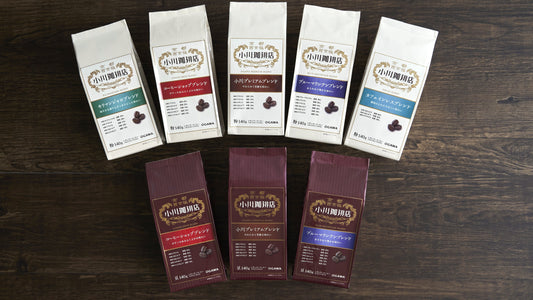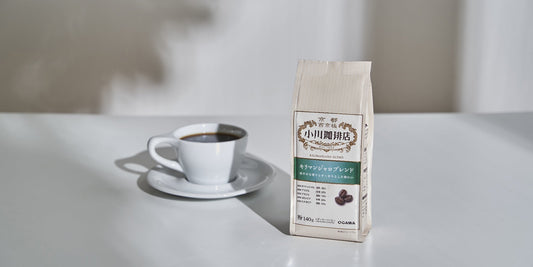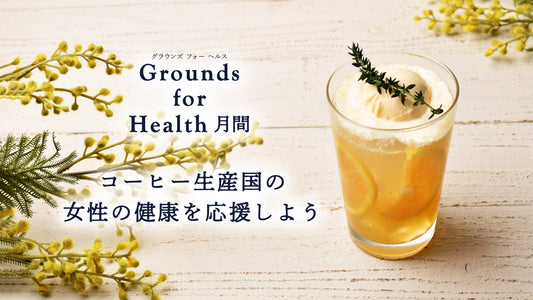What is ethical coffee?
Sustainable coffee bean procurement and cultivation environment
Have you heard of "ethical coffee"?
Ethical coffee is deeply connected to "ethical consumption," a consumption activity that aims to build a sustainable world, and is a coffee that can contribute to society for a better future for the Earth.
What types of ethical coffee are there? And how can you contribute to society by choosing ethical coffee?
We hope that this will help turn your everyday coffee into a delicious and happy cup that also contributes to society.
What is ethical coffee?
The "ethical" in ethical coffee means "ethical, moral."
Generally, coffee beans are often produced in developing countries, and it is problematic that they are sometimes traded at unfairly low prices to producers. There are also concerns about the impact that the development of coffee plantations has on nature and ecosystems.
To solve these problems, coffee that is sourced through fair trade practices and grown in a way that puts less strain on the environment is called "ethical coffee."
Ethical coffee is inspected by a third party and is given a certification mark that proves it has cleared the established inspection standards.
How can you contribute to society by choosing ethical coffee?
"International Fairtrade Certified Coffee" protects the livelihoods of coffee producers
Most coffee-producing countries are so-called developing countries. The price of coffee beans is determined on the international market. Vulnerable producers are sometimes forced into a situation where they have no choice but to sell at a price below the cost of production. As a result, they are unable to earn the profits necessary for production and living, and are forced to live an unstable life.
To prevent such a situation, fair trade is a trading system in which agricultural products and other products from developing countries are imported and consumed at a fair price that takes into consideration the livelihood of farmers, rather than purchasing them at market price. Ogawa Coffee obtained a manufacturing license for international fair trade certified products in 2003, and began selling international fair trade certified coffee in 2004.
For example, products that meet standards such as paying fair prices to producers and protecting their working conditions are marked with the "Fair Trade International" certification mark.
By purchasing products with this mark, you can contribute to improving the wages and production conditions of coffee producers and protecting their livelihoods.
Improving the lives of coffee producers will lead to more sustainable coffee bean procurement and improved quality, which will ultimately benefit consumers.

Organic Ethiopia Yirgacheffe Mocha Powder 150g

Organic Coffee Fairtrade Mocha Blend Drip Coffee (6 cups)
"Bird Friendly" to protect the growing environment in coffee producing areas
Bird Friendly is a program that cultivates and trades coffee while protecting the forests and natural environments that serve as habitats for migratory birds.
Traditional coffee cultivation was carried out in an environment close to natural forests, known as shade-grown. Migratory birds used the forests as resting places and fed on the insects that inhabit them. However, in recent years, the forests have been cleared to reduce costs, and coffee plantations that use machines for harvesting have increased, resulting in the loss of the natural environment and a decline in the number of migratory birds.
The Bird Friendly Certification program was created to help maintain farms in environments that are as close to natural forests as possible.
"Ogawa Coffee" started selling the first "Bird Friendly® Certified Coffee" in Japan in 2005. We want to convey the importance of the natural environment to our customers through the taste of this coffee.
"JAS certified organic coffee"
Organic coffee is grown using the power of nature to the fullest extent possible, without relying on chemically synthesized pesticides, fertilizers, genetic modification, etc. Not only does it reduce the burden on the environment, such as the soil, but it also has less impact on the health of producers working on the farms, making it a more environmentally friendly agricultural method.
Only foods that have cleared the strict inspection standards set by registered certification bodies at farms and manufacturing plants are allowed to display the "Organic JAS Mark."
Ogawa Coffee obtained JAS organic certification for its Kyoto factory in 2001. In order to deliver delicious coffee to everyone, we are also working to create a sustainable coffee growing environment through the sale of organic coffee.
Orangutan Coffee
The Orangutan Coffee Project is a project that produces high-quality coffee while protecting the rainforests where orangutans live and enriching the lives of local coffee producers.
The project not only supports environmental improvement in production areas, but also supports activities to protect orangutans and the environment by donating a portion of the sales of green beans to the conservation organization PanEco and producers.
We also work hard with producers to improve the quality of our coffee.
Ogawa Coffee was the first in Asia to start selling Orangutan Coffee in 2017. Orangutan Coffee is filled with the thoughts of many people, for orangutans, coffee producers, coffee lovers, and above all, the Earth.
One of Love Project
The "One of Love Project" is a support activity that aims to improve the educational environment for children in developing countries and the employment opportunities for their working mothers through music and roses. This project began when percussionists Nov Saito and Mari Natsuki went on a trip to "deliver music to children in developing countries."
On their travels to Ethiopia and Bangladesh, the pair met children who lived in harsh environments but kept smiling and trying their best to live their lives. They wanted to help them grow up healthy. With this in mind, they launched the "One of Love Project" in 2009. They hold a gig every year on June 21st, which is World Music Day, and continue to donate the proceeds from the sale of their original rose "Mari Rouge" (the 21st of each month is Mari Rouge Day) to developing countries.
Ethiopia is the birthplace of coffee. Of course, it is still known as one of the world's leading coffee producing regions. Ethiopia is a place that seems far away but is close to Ogawa Coffee. Ogawa Coffee has started activities to support the "One of Love Project". On "Mari Rouge Day" on the 21st of each month, customers who order limited-edition coffee are served coffee in Kyo-yaki/Kiyomizu-yaki cups with a crimson rose "Mari Rouge" painted on them (only at Ogawa Coffee Main Store, Kyoto Sanjo Store, and OGAWA COFFEE Kyoto Store). The first 10 customers are presented with a "Mari Rouge" flower. In order to let as many people as possible know about the project. We would like to continue thinking about what we can do through coffee.
One of Love Project Related Products "Tomorrow" for People and the Earth "ASUE Fairtrade Coffee" - A cup of coffee that protects society and the environment
This is a simple drip coffee that allows you to easily enjoy two types of coffee made with organic coffee from Ethiopia.
[Active]
This coffee has a refreshing taste that makes use of its sweet aroma and refreshing acidity.
It evokes an image of a refreshing and active mood.
Aroma: 5 Bitterness: 3 Sourness: 4 Body: 4
[Relax]
This coffee has a rich flavor that makes use of its mellow aroma and mellow sweetness.
I imagined a laid-back, relaxing scene.
Aroma: 5 Bitterness: 3 Sourness: 3 Body: 3
Grounds for Health Project
Grounds for Health is an organization that works primarily in Ethiopia and Kenya, led by staff from local medical institutions, to promote the health of women in coffee-producing countries, particularly with the aim of early detection and treatment of cervical cancer.
Ogawa Coffee has been running a campaign to support Grounds for Health since 2009. Our hope is that by supporting this initiative, we can encourage early detection of illness and save as many lives as possible. We will continue to value "what a cup of coffee can do" and to be a company that is close to producers.
Give the gift of ethical coffee
Click here for a list of Ogawa Coffee's ethical coffees.




















